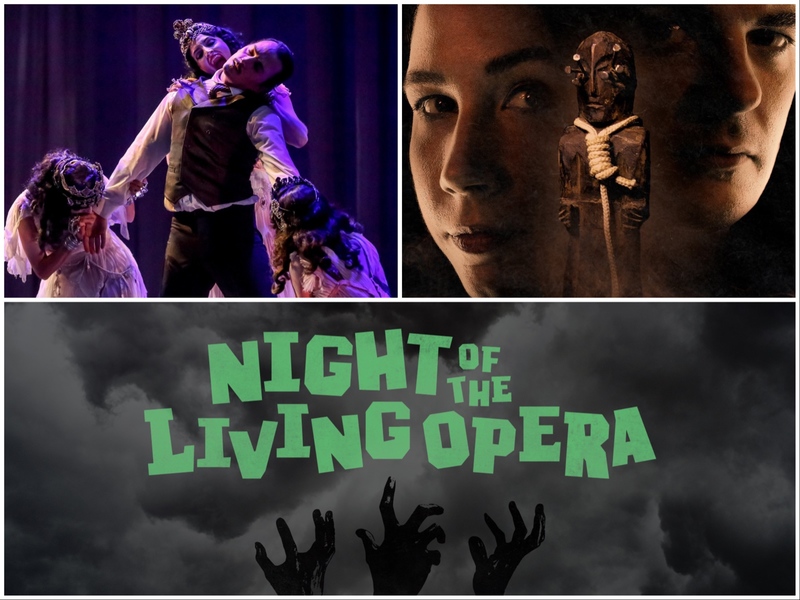There are three distinct productions of "The Comedy of Errors" appearing through July 13 as part of Optimist Theatre’s Shakespeare in the Park performances, in the outdoor Peck Pavilion adjacent to the Marcus Center for the Performing Arts. Individually they are incomplete; together they are incomprehensible.
One is contained in the set. It’s a bright, almost gaudy world that smacks of 1980s Miami. Washed with papaya pink and seafoam green, it sports neon accents, a Neo Deco mural and an array of colorful obelisks that are regularly rearranged throughout the show for no real reason. (Set design by Posy Knight.)
This flamingo-colored landscape is bolstered thematically by interstitial music that could be the playlist from an '80s pop radio station, featuring Cyndi Lauper, Culture Club, A-ha, Modern English and every other single that was played at my high school homecoming dance. This version is exuberant and excessive. It’s specific and kitschy, a foreign land that would surely confuse at least one pair of lost twins.
A second production is embodied in the costumes. Christy Siebers, an experienced designer who is also the wardrobe supervisor for the Milwaukee Ballet, has done an extraordinary job of marrying a stark black and white color palette with a distinctively whimsical style that veers toward steampunk and circus attire. For a ludicrous comedy based on broad types and mistaken identities, Siebers’s satin corsets, frilly tulle bustles, top hats, suits full of plaids and stripes, and patterned stockings strike a decidedly silly chord. Somewhere in between elegance and vaudeville, the costumes create a world unto themselves. They were, by far, the most creative and interesting part of the show.
A third version of Shakespeare’s wackiest comedy belongs to the actors and co-directors Mary Lynn Cogar and Ron Scot Fry. Optimist Theatre has taken the most simple, straightforward, one-joke show Shakespeare ever penned and completely depleted it of energy and comedy. In a genre where speed is essential, most of the actors deliver their lines very slowly, as if they are reading to a small child or trying desperately to pass an elocution test.
When the comic device – two sets of twin brothers being constantly mistaken for one another – is so painfully obvious to the audience, seeing the characters baffled again and again in slow motion isn’t just unfunny; it’s tedious. Similarly, the fight choreography was done at half-tempo, so far away from realism, it didn’t even qualify as cartoonish.
Presented together, this production of "Comedy of Errors" is a confusing collage. It appears that the design teams and the directors had never met before opening night, let alone worked to collaborate on a unified production. The dissonance between the set, costumes and script was bizarre, as none of these elements made any effort to complement or enhance the others.
While the overall production suffered from a lack of imagination in presentation, veteran actors Libby Amato (Luciana), Tami Workentin (a merchant and courtesan) and James Pickering (Egeon and Balthazar) did some very nice character work in spite of their lack of direction. Each actor clearly understood and embroidered their parts, giving them clarity and specificity.
When Amato’s Luciana is being courted by her brother-in-law Antipholus of Syracusa (Thorin Ketelson), her maiden fantasies are clearly read in her face – and alternately, her concern for her sister Adriana (Katherine Norman) feels both swift and real. Likewise, Pickering makes Egeon’s long, expository speech at the top of the show easily understood and appropriately grave. And Workentin can’t help herself from spicing up the role of the courtesan, adding in genuinely humorous business with a cigarette and some sultry poses that accentuate a working girl’s best features.
In addition, younger performers Rebekah Farr and Cole Conrad each created solid, earnest Dromios that could easily have been the foundation for something more remarkable.
The concept of Shakespeare in the park is a solid one: We know that there is something magical about hearing 400-year-old poetry under the stars. In New York’s Central Park, or in American Players Theatre’s secluded stage in the woods of Spring Green, these evenings can be truly sublime. But even with pre-show reassurances from Optimist’s executive producer Susan Fry that the Bard himself had to contend with the noises of a bustling city at the Globe Theater, the venue’s exposure to traffic is a genuine problem.
Actors’ voices routinely compete with the roar of Harley-Davidsons, blaring car radios, the alarm bells of caution gates as the bridges raise and lower, police sirens and the conversations of passersby. It’s impossible to blot out this symphony of urban distractions.
On Friday night of opening weekend, theatergoers who attended "Comedy of Errors" (filling about one-third of the available seats) drove Downtown through traffic for a Brewers game, Summerfest, Comic Con and a comedy show at the Pabst Theater. Even with free tickets, I’m not sure it was worth the effort.







